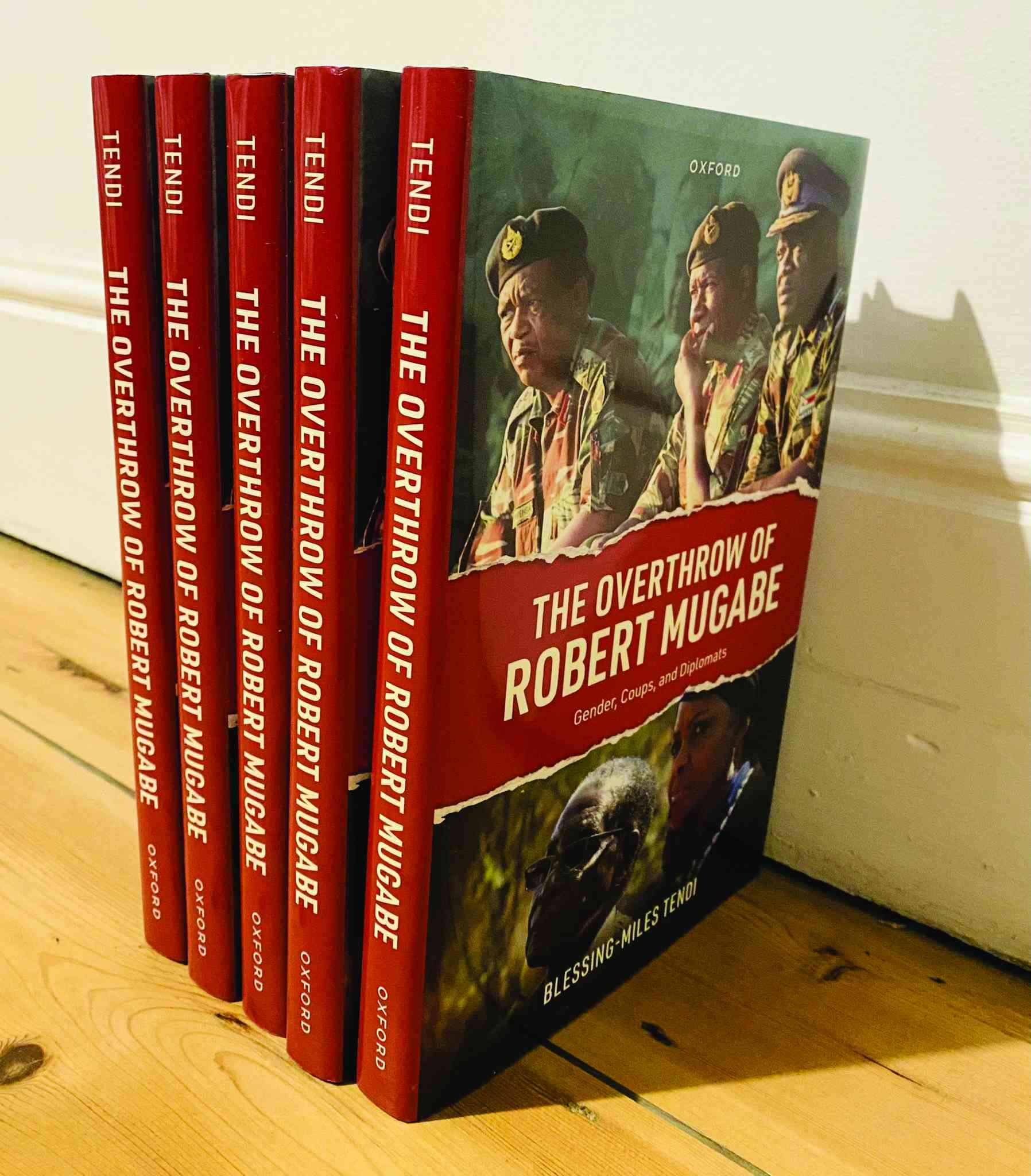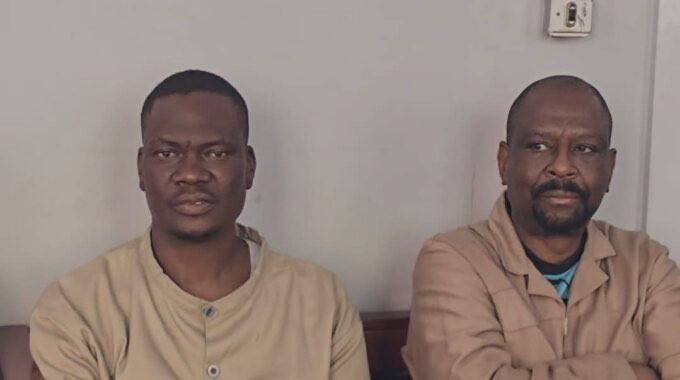
BELOW is an extract from The Overthrow of Robert Mugabe: Gender, Coups, and Diplomats. Tendi’s book is available in local bookstores.
On the night of 14 November 2017 Zimbabwean soldiers completed the most crucial phase of Operation Restore Legacy (ORL).
The soldiers successfully placed (former president Robert) Mugabe under house arrest, they took over the government-controlled Zimbabwe Broadcasting Corporation (ZBC) station, and secured other strategic and symbolic sites in and around the capital city Harare.
Armed soldiers rapidly neutralised two focal branches of the security sector, the Zimbabwe Republic Police (ZRP) and Central Intelligence Organisation (CIO), because military generals considered them potential threats to ORL’s success.
Furthermore, groups of soldiers conducted violent raids on the family homes of Saviour Kasukuwere, Jonathan Moyo and Ignatius Chombo, ministers in Mugabe’s government that some generals disapproved of vehemently.
In the early morning hours of 15 November, a serving army Major General, Sibusiso Moyo, accompanied by a senior Air Force officer, then appeared in a live ZBC television broadcast, in which Moyo stated:
“Mugabe and his family are safe and sound and their security is guaranteed. We are only targeting criminals around him, who are committing crimes that are causing social and economic suffering in the country, in order to bring them to justice. As soon as we have accomplished our mission we expect that the situation will return to normalcy…. To the world beyond our borders, we wish to make it abundantly clear that this is not a military takeover of government. What the ZDF (Zimbabwe Defence Forces) is doing is to pacify a degenerating social, political and economic situation in our country, which if not addressed may result in violent conflict.…”
Major General Moyo tried to construct ORL as not a coup, but his justifications for the operation closely resembled validations issued by coup doers historically.
- Letter from America: Is former president Donald Trump a hero or villain?
- Zanu PF shutting down political space
- Parties condemn Afrophobic attacks in SA
- Top CIO boss up for extortion
Keep Reading
Evidence for this can be found in Staffan Wiking’s comparative investigation of the ways in which army officers in Sub-Saharan Africa, from 1958 through to the 1980s, attempted to justify coups when they made their “Initial Declaration” (ID).
Wiking’s study establishes that “one can recognise the same types of justifications in the various IDs and one can reduce them to a limited number of recurrent issues”. Recurrent coup justifications identified by Wiking, which Major General Moyo’s ID reiterated, are politicians’ misrule, public sector corruption, the nation’s socio-economic misery, democratic deficit in the body politic and the short-term nature of the army’s selfless intervention to rectify injustices caused by civilian leaders.
The lingua franca of restoration is another recurrent theme in coup IDs. The perpetrators of Niger’s 2010 coup labelled themselves the “Supreme Council for the Restoration of Democracy”.
The leaders of Gabon’s unsuccessful January 2019 coup called themselves the “National Restoration Council”. The junta that seized power in Burkina Faso in 2022 styled itself as the “Patriotic Movement for Safeguard and Restoration”.
The makers of Gabon’s successful 2023 coup adopted the name “Committee for the Transition and Restoration of Institutions”. The Zimbabwean military’s Operation Restore Legacy referred to the restoration of the political authority of liberation struggle actors.
Major General Moyo maintained that if the military did not “pacify a degenerating social, political and economic situation” Zimbabwe would descend into “violent conflict”.
This justification about impending national violence, unrest or catastrophe if the military abstained from intervening in politics to save the country from a dire political, social and economic situation is standard in coup IDs.
Coup doers “are prone to call in the spectre of civil war to justify their seizing power but such appeals do not function as part of any general conception of human nature or of government responsibility but rather as a language appropriate to back up military appeals for support”.
In 1963, Colonel Christophe Soglo led a military coup in Benin, on the back of massive workers’ protests over worsening socio-economic circumstances.
Soglo declared that “in view of the gravity of the situation”, the military was forced to intervene. Major Charles Blake led Sierra Leone’s 1967 coup in order to address the calamitous “economic situation” unfolding in the country.
When Warrant Officer (Class II) Sam Wilfred Aswa made the ID of the 1971 coup that brought Idi Amin to power in Uganda, he stated: “it has been necessary take action to save the situation from getting worse”.
General Murtala Muhammed, leader of Nigeria’s 1975 coup born government, stated in his first national broadcast: “Nigeria has been left to drift.
This situation, if not arrested, would inevitably have resulted in chaos and even bloodshed… the armed forces, having examined the situation, came to the conclusion that certain changes were inevitable”.
Analogously, when Major General Muhammadu Buhari ousted Nigerian President (1979-1983) Shehu Shagari in a military coup in 1983, he declared: “we (the Nigerian military) have dutifully intervened to save the nation from imminent collapse”.
Major General Moyo’s denial that ORL was a coup because the military was “only targeting criminals around” Mugabe is flagrantly implausible, a characteristic of denials of unconstitutional action made by militaries elsewhere.
For example, when Colonel Alphonse Amadou Alley came to power in a 1967 military coup in Benin, he asserted that the military’s action “was not a coup. We only relieved two quarrelling presidents of their duties”.
In 1960, in the Republic of Congo (subsequently renamed Zaire, then Democratic Republic of Congo), “on the evening of September 14… the military figure Joseph Mobutu proclaimed on public radio that he was “neutralising” the feuding duo of prime minister (June-September 1960) Patrice Lumumba and president (1960-1965) Joseph Kasa-Vubu.
Mobutu claimed, unrealistically, that his “neutralising” of Congolese politicians was “not a military coup d’état, but merely a peaceful revolution”.
Mobutu’s casting of the 1960 Republic of Congo coup as “a peaceful revolution” is identical to Emmerson Mnangagwa’s claim 57 years later, in the New York Times, that ORL was a “peaceful revolution”.
ORL bore important operational hallmarks of a coup d’état, such as a uniformed serving army officer announcing on national radio and television the military’s political intercession and soldiers’ occupation of the country’s strategic and symbolic locations and routes.
Moreover, in coup instances “the degree of violence involved can range from none, so called ‘bloodless coups’, to pronounced”. Examples of relatively bloodless coups are Sierra Leone (1968), Nigeria (1985), Gambia (1994) and Chad (2021), whilst Liberia (1980), Burkina Faso (1987 and October 2022) and Sierra Leone (1997) were bloody affairs.
That said, military coups are relatively peaceful occurrences, given that it is not the norm for them to degenerate into out-and-out civil conflict.
Thus, Zimbabwean generals misleadingly depicted ORL as “bloodless”, violence free and non-destructive of property, in an attempt to cast ORL as distinct from a coup.
- Tendi’s latest book, The Overthrow of Robert Mugabe: Gender, Coups and Diplomats, is available in Zimbabwe via Innov8 Bookshop.











